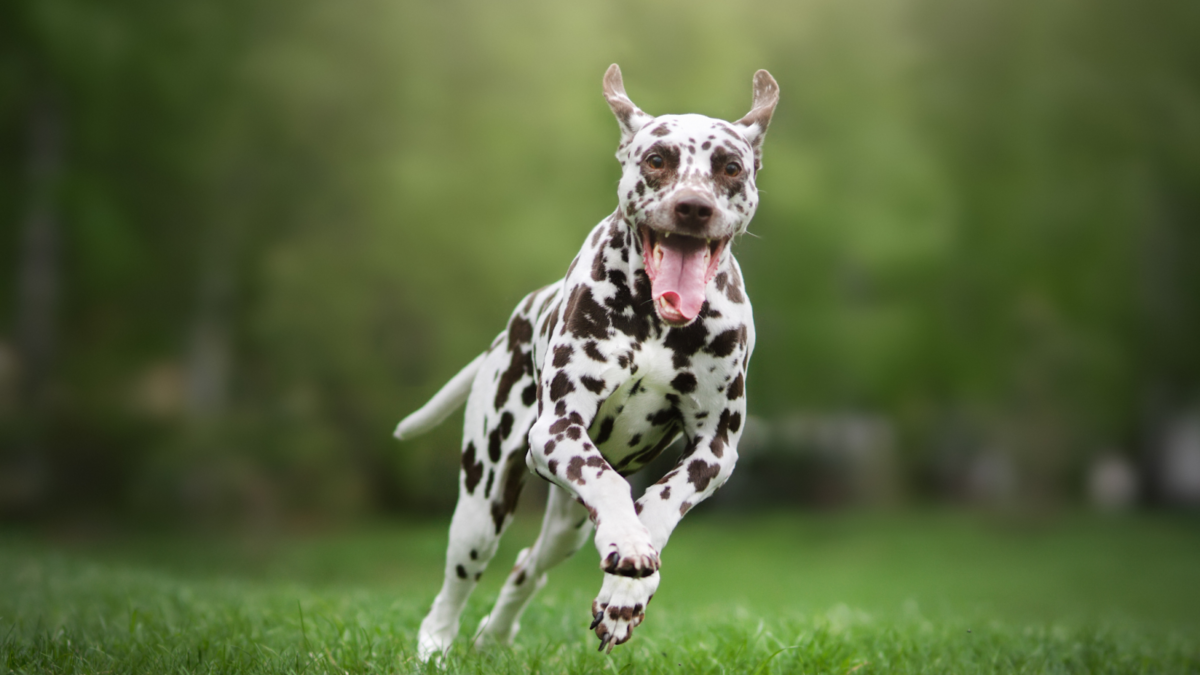If you’re the proud owner of a spotted Dalmatian, you already know they’re energetic and playful dogs. These pups were originally bred to run alongside carriages, which means they’ve got plenty of stamina and a need for regular exercise. Your Dalmatian isn’t just looking to stretch their legs; they need enough physical activity to keep both their body and mind in tip-top shape.
So, getting a Dalmatian is a big commitment. In this article, we are going to look at what a good exercise regimen looks like, using the best veterinary and scientific experts available. This includes Dr. J. Derrell Clark who did a lot of research on housing and exercising dogs.
Meeting the exercise needs of your Dalmatian is key to their overall well-being. Aim for at least one to two hours of exercise each day. This can be broken down into walks, runs, or play sessions. Not only does this help burn off their abundant energy, but it also prevents boredom and potential behavior problems that can arise when they’re not sufficiently stimulated.
So, How Much Exercise Does A Dalmatian Dog Need?
Dalmatians are naturally athletic and have considerable stamina. They’re built for long distance running, and a short stroll around the block won’t cut it. Your Dalmatian will thrive with 1 to 2 hours of exercise per day. This could include running or even engaging routines that add variety to your dog’s physical activity.
On average, aim for a minimum of one hour daily of exercise, preferably two hours. Break this into two sessions if possible, focusing on activities that allow your dog to expend energy steadily. Morning jogs can start the day off right, with an evening bike ride or hike to wind down.
High-energy activities, especially ones that cover a lot of distance like running, are essential. Dalmatians enjoy running alongside you, whether that’s during your morning jog or a biking session. You’ll both get a great workout and strengthen your bond. Remember, these dogs need structured exercise; without it, they may display unwanted behaviors born of pent-up energy.
A major issue that can arise with Dalmatians if they don’t get enough exercise is hyperactivity. This can make them difficult to manage and impact your bond with your dog. So, if you are a runner or enjoy cycling, the Dalmatian is the dog for you.
Canicross is also an excellent workout for your Dalmatian. It encompasses both their need for running and the opportunity for the two of you to work as a team. If you haven’t heard of it, canicross is essentially cross-country running with your dog.
Mixing up exercises keeps things interesting for your dog, so don’t shy away from varied terrains and new places. Each new trail or path provides sensory stimulation and physical challenges that keep your Dalmatian healthy both mentally and physically.
Understanding Dalmatians
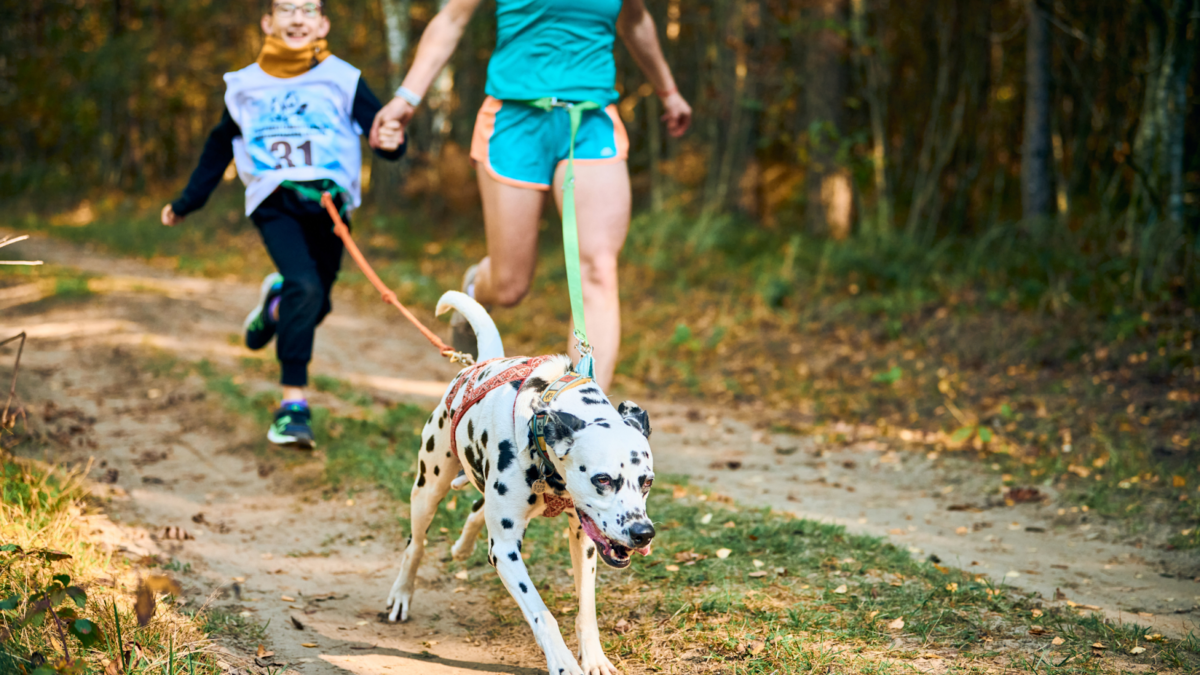
This section delves into the unique characteristics and health considerations of Dalmatians. It’s important to understand these aspects to cater to their exercise needs effectively.
Breed Characteristics
Dalmatians are known for their distinctive white coats with black or liver spots. As a medium to large breed, adult Dalmatians typically weigh between 45 to 70 pounds. Their energy levels are quite high, which aligns with their historical role as carriage dogs, meaning they thrive on plenty of running for miles. Their personality is friendly, lively, and playful, but they require proper training and socialization from a young age.
When it comes to puppies, it’s important to remember that vigorous exercise should wait until they are fully grown, which is typically over 18 months, to prevent joint damage.
Health Considerations
Dalmatians come with a set of health issues that potential and current owners should be aware of. One such issue is deafness, with some puppies being born deaf in one or both ears. It’s essential for Dalmatians to undergo hearing tests early on. Their unique short coat also means they require less grooming, but they are still prone to shedding.
Another significant health consideration is their predisposition to urinary stones. To manage their health problems, it’s crucial for Dalmatians to stay hydrated and maintain a diet suitable for their unique needs, coupled with regular exercise to help prevent obesity and related complications.
Exercise Essentials For Dalmatians
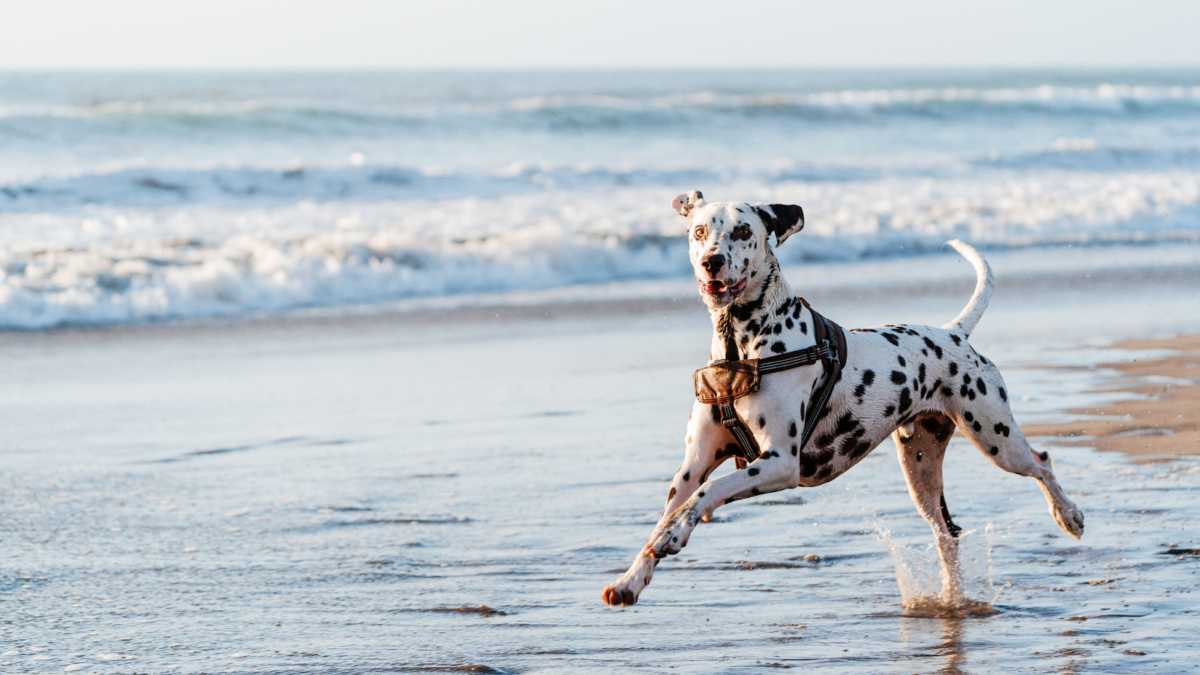
Dalmatians are a highly energetic and intelligent breed, so it’s important for their health and happiness that they get plenty of exercise. You’ll want to keep their energy levels and age in mind as you plan their activities.
Physical Exercise Requirements
Your Dalmatian needs regular physical exercise to stay healthy and happy. Aim for at least one-to-two hours of exercise each day, but more is even better, especially for adults. Puppies will require shorter, more frequent periods of activity to help with their development without overdoing it. As your Dalmatian matures into a senior, you might notice that they can’t keep up with the pace they once did, and you’ll need to adjust accordingly.
Types of Activities
For your Dalmatian, a mix of activities is best. Running is a great way to burn off energy, and it helps keep their muscles toned. Walking is a little less intense but still valuable, especially for senior Dalmatians who may not manage long runs anymore. Hiking is not only good exercise but also offers mental stimulation from new sights and smells.
Swimming provides a low-impact way to strengthen muscles, and some Dalmatians love the water. And don’t forget playtime; it’s essential for their mental and emotional well-being.
Understanding Exercise Needs by Age For Dalmatians
When they’re puppies, keep exercises short but engaging to cater to their developing bodies. The growth plates in their legs need to close before they can safely join you on a jog. This means you typically need to wait until they are roughly 18 months before you can start them running.
However, as they grow into energetic adults, increase the intensity and duration to match their stamina. Remember, a tired Dalmatian is a happy Dalmatian.
However, once they reach their senior years, watch for signs of fatigue and provide gentler exercise options to keep them active without straining their older bodies. Keeping your Dalmatian at the right level of activity for their age ensures a better quality of life.
Training and Mental Stimulation
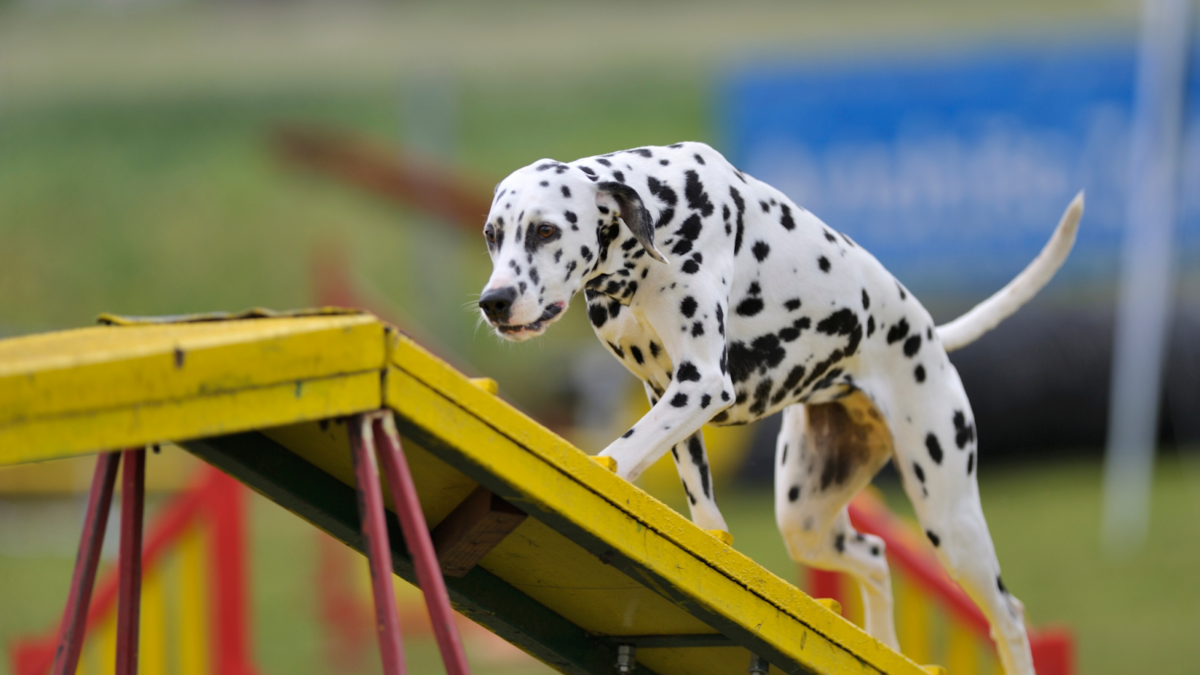
When you have a Dalmatian, providing plenty of exercise and mental stimulation is vital. Not only does this help keep your dog physically fit, but it also keeps their mind sharp and prevents boredom-related behavioral issues.
Positive Reinforcement Techniques
Positive reinforcement is a great way to teach your Dalmatian new behaviors. This means rewarding your dog for good behavior, which encourages them to repeat it. You can use treats, praises, or toys as rewards. For example, when your Dalmatian completes an agility course correctly, give them a treat.
Mental Engagement Through Play
Interactive games like fetch or frisbee provide both physical activity and mental stimulation. But you can also add in puzzle toys that challenge your Dalmatian to solve problems to get a reward. If you’re feeling creative, set up a treasure hunt by hiding treats around your garden for your dog to find.
Preventing Destructive Behavior
Dalmatians can develop destructive behavior if they’re not given enough mental stimulation. Make sure you mix up their activities to keep things exciting. Consistent training sessions are as important as the mental games you play. If they start getting into trouble, it’s a sign they need more to do.
The Importance of Consistency
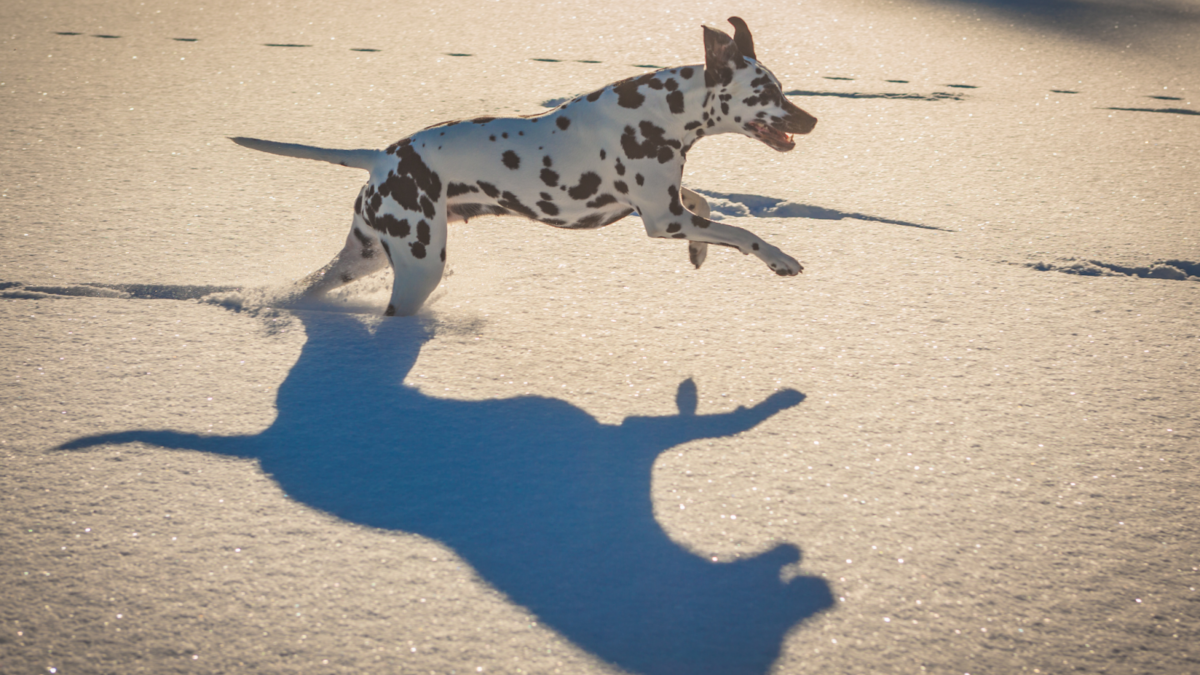
When you own a Dalmatian, maintaining a consistent routine for exercise is key. This not only helps to keep their joints healthy but also ensures they stay fit and mentally stimulated.
Daily Routines
You’ll want to get your Dalmatian on a daily walk schedule. Like having meals at the same time each day gives you a sense of regularity, a daily walk will do the same for your pal. It’s best to aim for at least two hours of exercise daily. You might break this into two sessions – one in the morning and another in the evening – to keep energy levels balanced and avoid any potential over-exercise issues.
Weather Considerations
While sticking to your walk schedule, keep an eye on the weather. On hot days, you should avoid the peak sun hours to protect your Dalmatian’s joints and overall health. If it’s cold or rainy, consider shorter walks paired with indoor play. You’ll want to adjust activity levels appropriately and not allow bad weather to disrupt your consistent routine too much.
You can also see this article on when it is too cold to walk your dog.
Managing Over-Exercise
It’s equally important not to overdo it. Over-exercise can be harmful, especially if your Dalmatian is not accustomed to high levels of activity. Pay attention to their behavior: if they’re lagging behind or showing signs of fatigue, it’s time to cut the exercise short. Regular, moderate exercise is better than sporadic intense sessions, so keep it steady to benefit their health in the long run.
Advanced Training and Sports
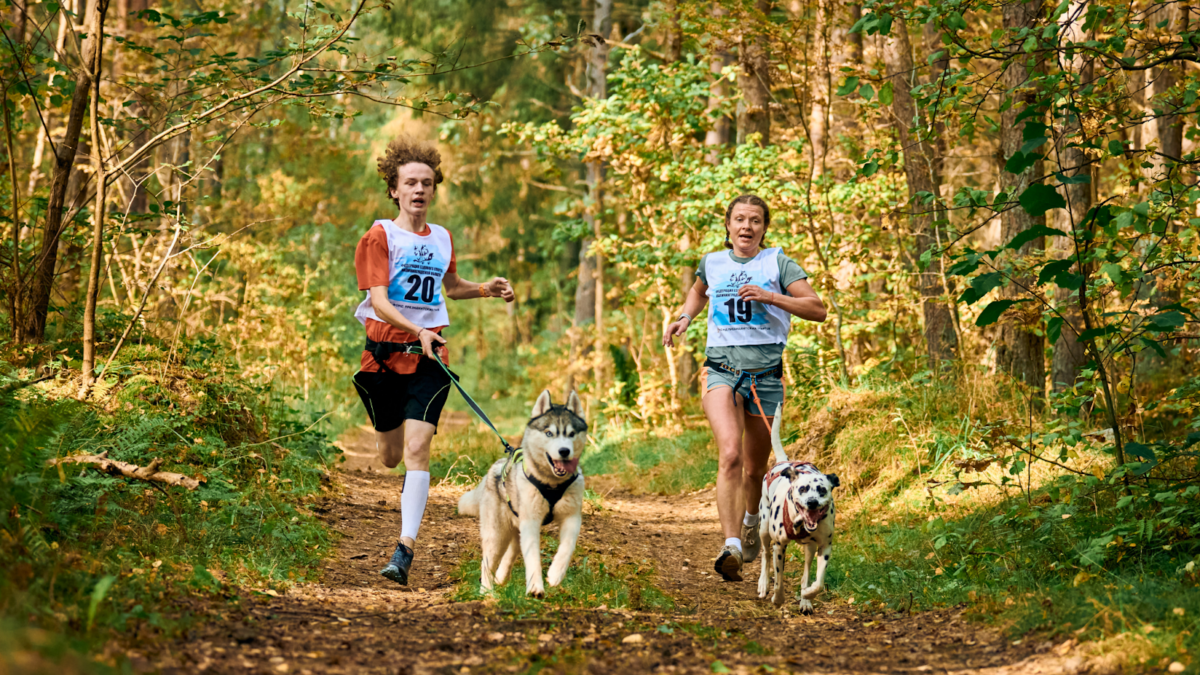
When you’re thinking about advanced training and sports for your Dalmatian, consider activities that cater to their natural abilities and high energy levels. These dogs were historically used as carriage dogs, meaning they have a lot of stamina and enjoy running. They excel at sports that require quick thinking and athleticism, such as agility training and competitive events.
Agility Training
Your Dalmatian’s heritage makes them a natural at agility training. This sort of activity provides both physical exercise and mental enrichment. You can start with backyard agility setups to get a feel for the sport. Simple homemade obstacles like tunnels and weave poles can help sharpen your dog’s reflexes and give them a fun workout. Remember, always encourage your Dalmatian with positive reinforcement when they do well.
Competitive Sports and Events
Competitive sports and events can take your Dalmatian’s training to the next level. Engage in sports like Cani Cross, where you and your Dalmatian can run together cross-country, Bikejoring, where your dog pulls you on a bike, or even Skijoring, if you’re in a snowy environment. These activities not only let your Dalmatian burn off their considerable energy, but also strengthen your bond with them. During warmer months, activities such as hiking can complement their regimen well. Remember, when you’re participating in these sports, it’s crucial to build up your Dalmatian’s endurance gradually to prevent injuries.
Nutritional Considerations for Active Dalmatians
When your Dalmatian is active, picking the right food and keeping them hydrated is key. You want to make sure their energy levels are supported by their diet and that they maintain a healthy weight.
Choosing the Right Dog Food
For your energetic Dalmatian, dry dog food that is high in protein can help support their muscle maintenance and energy needs. Since Dalmatians can be prone to weight gain, look for formulas tailored to active breeds that contain a balanced calorie content to match their exercise routine.
Avoid foods with fillers that offer little nutritional value. Foods that support a healthy coat can be especially beneficial as active Dalmatians may be more prone to shedding due to increased activity.
Hydration and Energy
Keeping your Dalmatian hydrated is crucial, especially during and after exercise. Always have fresh water available, and if you’re out for a long walk or play session, carry a portable water bottle or bowl for your dog’s water breaks. Staying hydrated ensures your Dalmatian’s energy levels remain steady, and it helps prevent overheating, which can be dangerous. Keep an eye on their water intake, as this can vary with their activity level and the weather.
Socialization and Recreation
When you bring a Dalmatian into your home, you’re not just getting a pet; you’re getting a bundle of energy that craves social interaction. Whether it’s with your family, other pets, or new friends at the dog park, your Dalmatian needs regular socializing and play to stay happy and healthy.
The Role of Socializing
Your Dalmatian loves attention and thrives on being part of the action. Socializing is key for these active breeds because it not only prevents them from feeling isolated but also keeps their high energy in check. Introduce them to a variety of situations – from busy parks to quiet streets – to help them become well-rounded and adaptable. When they meet new people and other dogs, it helps them become more comfortable in different environments, which is great for their development.
- With Children: Dalmatians are naturally loyal and can be fantastic with kids, making them a wonderful family pet. Just be mindful that their size and enthusiasm may accidentally knock over smaller children.
- New Friends: Regular visits to dog parks allow for interaction with other canines, which is essential for their social development.
Family and Other Pets
Dalmatians are more than just pets; they become a part of your family. Their loyalty makes them a constant companion by your side. Having a Dalmatian means you’ve got a built-in running partner who can match your pace or even encourage you to pick up speed.
- Family Time: Engage in activities that allow your Dalmatian to burn off that high energy. A game of fetch, frisbee, or a family run are excellent ways to keep them active and involved.
- Other Pets: If you have other pets at home, your Dalmatian can get the essential socialization by simply interacting with them. Remember to supervise initial meetings to make sure all pets are comfortable and safe.
Remember, your Dalmatian’s socialization and recreational needs are not just a responsibility; they’re a journey of fun and bonding that benefits both of you.
Healthcare and Maintenance
When you have a Dalmatian, staying on top of healthcare and routine maintenance is crucial to prevent health issues. Regular check-ups and being prepared for any health changes, especially as your Dalmatian becomes senior, can keep your furry friend happy and healthy.
Routine Veterinary Care
Veterinarian Visits: It’s important for you to take your Dalmatian to the vet at least once a year for a check-up. Your vet can check their joints, look for signs of any health issues, and keep their vaccinations up to date.
- Vaccinations: Keep track of and maintain an up-to-date vaccination schedule to protect against diseases.
- Dental Care: Regular dental check-ups are vital to prevent dental diseases.
- Weight Management: Your vet can help manage your Dalmatian’s weight to avoid strain on their joints.
Senior Dalmatians: As they age, more frequent veterinary visits are necessary, generally every six months, to monitor any emerging health issues.
Importance of Pet Insurance
Why Invest in Pet Insurance?
Vet bills can be pricey. Having pet insurance helps you cover the costs of health issues without financial stress.
- Unexpected Illnesses: You’re covered if your Dalmatian gets suddenly sick.
- Accidents: If they get into an accident, pet insurance can be a big help.
Remember, the goal is to ensure your Dalmatian has a long, happy, and healthy life with you. Regular veterinary care and having a good pet insurance plan in place are the keys to achieving this. Keep this in mind, and you’ll be on the right track to providing the best care for your spotted friend.
Connecting with the Dalmatian Community
When you’re a Dalmatian owner, knowing how much exercise your spotted friend needs is crucial for their stamina, muscular health, and endurance. Connecting with other Dalmatian enthusiasts can be incredibly helpful, and there’s a wealth of resources you can tap into through clubs and online platforms.
Clubs and Organizations
Joining a local Dalmatian club affiliated with the American Kennel Club (AKC) offers you a community of experienced dog owners. These clubs often organize events, provide training tips, and can be an excellent source for exercise ideas tailored to a Dalmatian’s needs. The AKC also recognizes Dalmatian clubs that might specifically focus on the endurance and muscular health of these active dogs.
- Black-spotted Buddy Gatherings: Look for clubs that host Dalmatian-specific playgroups. It’s perfect for socialization and shared exercise time.
- Exercise-focused Groups: Seek out organizations that emphasize outdoor activities. Hiking, swimming, and other group activities can help improve your Dalmatian’s endurance.
Online Resources and Forums
These are your go-to for conversing with a wider Dalmatian community that might not be geographically close. Engage with social media groups or Dalmatian-specific forums.
- Dalmatian Health Forums: Search for discussions centered on maintaining a healthy weight and muscle tone through exercise.
- Interactive Platforms: Platforms like the Dalmatian Club of America forum can offer guidance on specific exercises and stamina-building activities.
Remember, your Dalmatian’s black and white spots need regular motion to stay sharp and beautiful!
Frequently Asked Questions (FAQs)
When it comes to a Dalmatian’s well-being, exercise is key. You’ve got questions; let’s dive into the specifics of keeping your spotted companion happy and healthy.
What’s the daily exercise requirement for keeping a Dalmatian healthy?
Your Dalmatian needs a good deal of exercise every day — usually about 60 minutes of physical activity. This helps to maintain their muscular build and keep their energy levels balanced.
How can you provide sufficient mental stimulation for a Dalmatian?
Mental stimulation for a Dalmatian can come from puzzle toys, obedience training, or interactive games. This mental exercise keeps their mind sharp and helps stave off boredom-related behaviors.
What are some effective ways to tire out a Dalmatian?
To tire out a Dalmatian, mix things up with runs, agility training, long walks, and playtime. A variety of activities will challenge them both physically and mentally.
Can you describe the maintenance level for a Dalmatian’s lifestyle?
Dalmatians have a moderate to high maintenance lifestyle. They require regular exercise, mental stimulation, grooming due to their short coat, and social interaction.
What kind of diet should a Dalmatian follow for optimal health?
A Dalmatian’s diet should be balanced, consisting of high-quality dog food tailored to their age, size, and activity level. Monitor their protein intake and ensure they always have fresh water available.
Do Dalmatians need special attention compared to other dog breeds like Labradors or Dobermans?
Yes, Dalmatians need special attention, particularly with their exercise and diet. They are more prone to urinary stones, so their diet needs to be managed carefully. Additionally, they often have more energy than breeds like Labradors or Dobermans and thus require abundant exercise and engagement.
Final Thoughts
When you’re planning your Dalmatian’s exercise routine, aim for at least one hour of physical activity each day. This breed is known for being energetic and requires a combination of both mental and physical stimulation. Here’s a quick rundown:
- Daily Walks: At a minimum, take your Dalmatian on long walks at a brisk pace. They love to trot alongside you, so keep that leash ready.
- Playtime: Include activities like fetch or frisbee in an enclosed space. Your Dalmatian’s sprinting skills will get a great workout.
- Mental Exercise: Dalmatians are smart. Mix in training sessions with puzzles or treat games to keep their mind engaged.
- Consistency is Key: Ensure that your schedule is regular. Dalmatians thrive on routine, and it helps prevent anxiety.
- Health Checks: Always keep an eye on their condition. If your Dalmatian is panting heavily or seems overtired, it’s time to take a break.
Remember, your furry friend’s needs may vary. Puppies and seniors won’t handle intense exercise like an adult can. Adjust the duration and intensity of the workouts accordingly. Your Dalmatian will show you with their behavior if they’re getting enough exercise — look for a happy demeanor and a good night’s sleep as positive signs!
- Clark, J.D., Rager, D.R., Crowell-Davis, S. and Evans, D.L., 1997. Housing and exercise of dogs: effects on behavior, immune function, and cortisol concentration. Comparative Medicine, 47(5), pp.500-510.
- Rovira, S., Munoz, A. and Benito, M., 2008. Effect of exercise on physiological, blood and endocrine parameters in search and rescue-trained dogs. VETERINARNI MEDICINA-PRAHA-, 53(6), p.333.
- Hill, R.C., 1998. The nutritional requirements of exercising dogs. The Journal of nutrition, 128(12), pp.2686S-2690S.
- Degeling, C., Burton, L. and McCormack, G.R., 2012. An investigation of the association between socio-demographic factors, dog-exercise requirements, and the amount of walking dogs receive. Canadian Journal of Veterinary Research, 76(3), pp.235-240.
- Domenech, R., Macho, P., Schwarze, H. and Sánchez, G., 2002. Exercise induces early and late myocardial preconditioning in dogs. Cardiovascular research, 55(3), pp.561-566.

